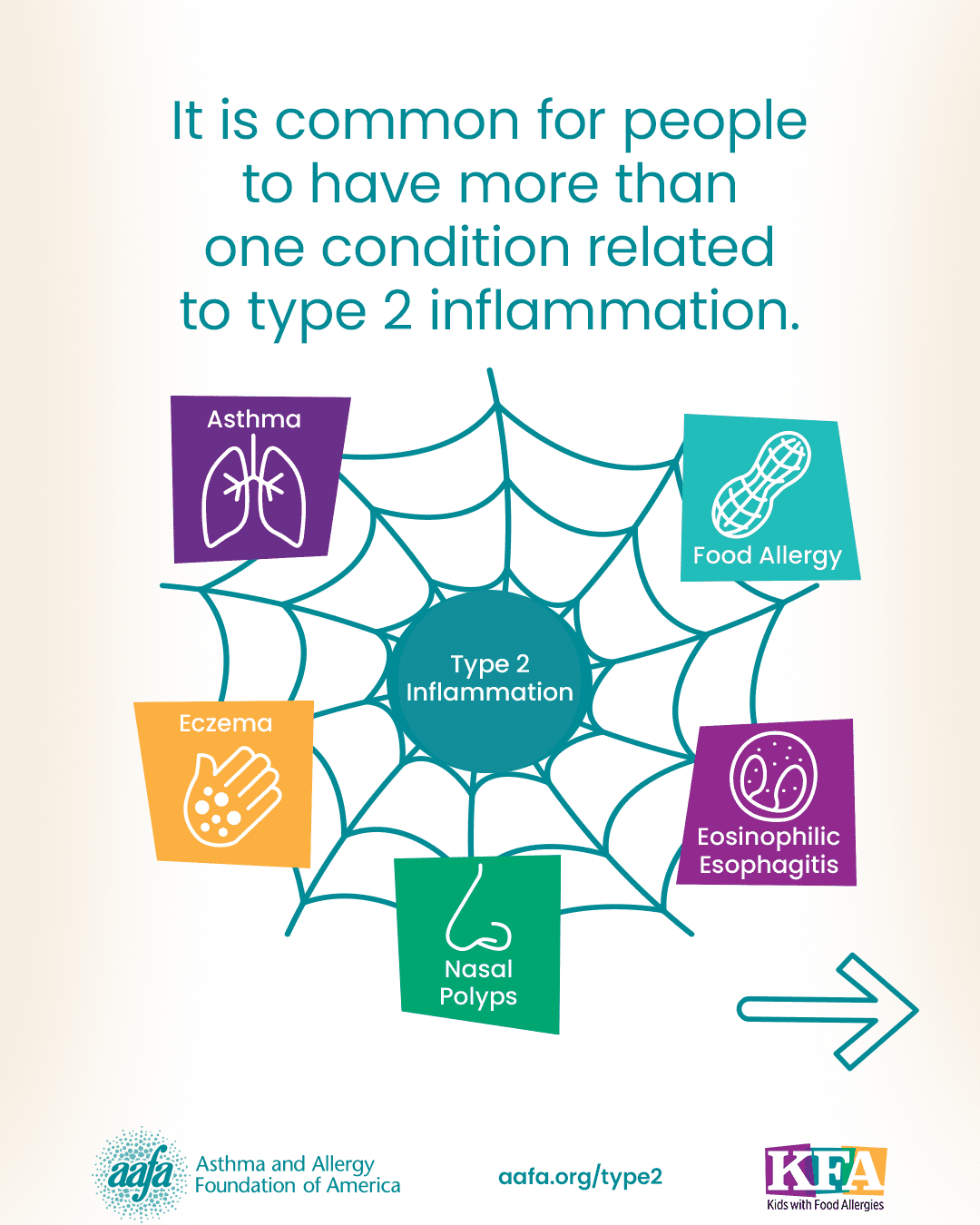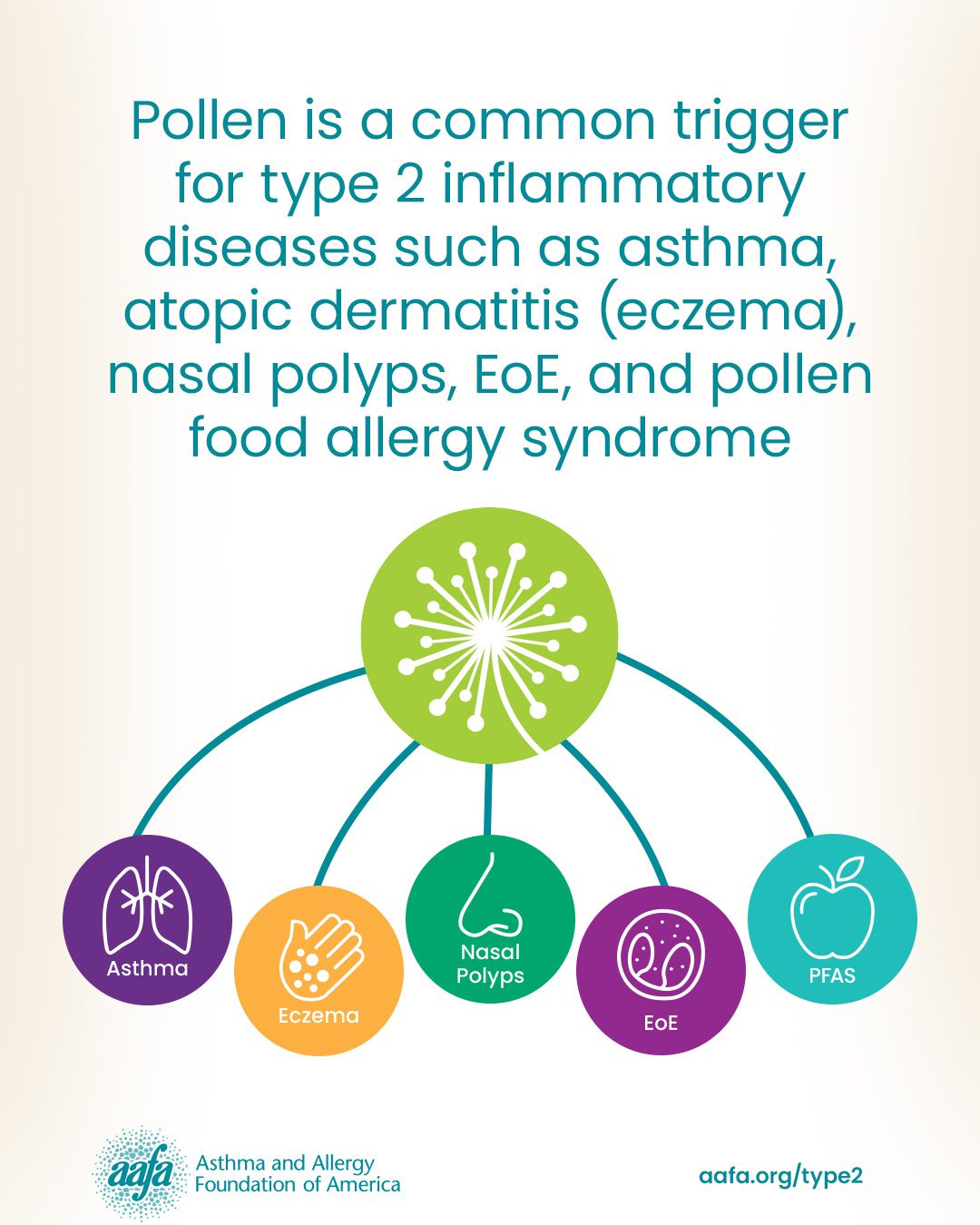News
AAFA Calls Attention to Type 2 Inflammatory Diseases During National Asthma and Allergy Awareness Month
Activities include recognition of first-ever World Eosinophilic Esophagitis (EoE) Day on May 22
Washington, D.C., May 19, 2025 – The Asthma and Allergy Foundation of America (AAFA) designates May 19-23 to be Type 2 Inflammation Awareness Week. Conditions such as asthma, allergies, eczema, eosinophilic esophagitis (EoE), and nasal polyps are often caused by type 2 inflammation.
“A common thread among asthma and many allergic diseases is type 2 inflammation,” said Melanie Carver, Chief Mission Officer at AAFA. “We want to take this week to focus attention on how these conditions are linked together. Understanding the underlying causes and common triggers of these related chronic conditions is paramount to improve the health of over 100 million people in the United States.”
What Is Type 2 Inflammation?
Everyone has something called a type 2 immune response. When your body senses certain kinds of “intruders”, it sends out specific immune cells to fight a battle against the intruders. In some people, these immune cells mistakenly overreact and can end up damaging the body itself. This overactive immune response is called type 2 inflammation.
What Diseases Are Connected by Type 2 Inflammation?
- Asthma
- Atopic dermatitis, a type of eczema
- Food allergies
- Eosinophilic esophagitis (EoE)
- Pollen food allergy syndrome (PFAS), also known as oral allergy syndrome (OAS)
- Nasal polyps, also known as chronic rhinosinusitis with nasal polyps
- Prurigo nodularis
It is common for people with type 2 inflammation to have more than one type 2 inflammatory disease. If you have symptoms like coughing, itching, congestion, sneezing, or difficulty eating foods, talk with your doctor.
“In many cases, early diagnosis can make a big difference. This starts with awareness and recognition,” said Carver. “Type 2 inflammatory conditions impact millions of people, but there are options available for managing and caring for these conditions.”
What Triggers Type 2 Inflammatory Diseases?
Type 2 inflammation can be triggered by allergens, irritants, and infections. One common allergen in particular—pollen—is a culprit for worsening many of these conditions. While many people associate pollen with nasal allergies, pollen can trigger several conditions associated with type 2 inflammation. These include asthma, atopic dermatitis, EoE, nasal polyps, and pollen food allergy syndrome.
Our 2025 Allergy Capitals™ report notes that due to climate change, pollen seasons are getting longer and more intense. This means people with type 2 inflammation are more likely to encounter the pollen that may trigger their symptoms for prolonged periods of time.
We recommend taking steps to reduce your exposure to pollen – including by tracking pollen counts and limiting time outside on days and at times when pollen counts are high. We also recommend working with your health care team to find treatments that address the underlying causes of your inflammation.
First-Ever World EoE Day – May 22, 2025
New this year, Type 2 Inflammation Awareness Week also features the first-ever World EoE Day on May 22, 2025.
World EoE Day is a global effort to raise awareness about EoE. EoE is a chronic inflammatory condition of the esophagus (the tube that connects the mouth to the stomach). EoE happens when a large number of white blood cells called eosinophils collect and cause damage in the lining of the esophagus. It is often an immune response to food, but in some cases, environmental pollen can also trigger EoE. The inflammation caused by eosinophils damages the surrounding tissue. Left untreated, EoE may cause the esophagus to narrow, contributing to food impactions (food getting stuck in the throat). Unexplained digestive issues—such as trouble swallowing, reflux that doesn’t get better with medicine, vomiting, and regurgitating food—could potentially be signs of EoE.
For more information, visit:
May Is Asthma and Allergy Awareness Month: aafa.org/awareness
Type 2 Inflammation: aafa.org/type2
World EoE Day: aafa.org/event/world-eoe-day-2025/
This content is developed independently by the Asthma and Allergy Foundation of America (AAFA) and made possible by contributions from Sanofi and Regeneron. We thank them for their support of AAFA’s 2025 Type 2 Inflammation Awareness Week and World EoE Day activities.
Press Contact:
Andy Spears
Public Affairs Manager
Asthma and Allergy Foundation of America (AAFA)
gro.afaa@aidem
About AAFA
Founded in 1953, AAFA is the oldest and largest non-profit patient organization dedicated to saving lives and reducing the burden of disease for people with asthma, allergies, and related conditions through research, education, advocacy, and support. AAFA offers extensive support for individuals and families affected by asthma and allergic diseases, such as food allergies and atopic dermatitis (eczema). Through its online patient support communities, network of regional chapters, and collaborations with community-based groups, AAFA empowers patients and their families by providing practical, evidence-based information and community programs and services. AAFA is the only asthma and allergy patient advocacy group that is certified to meet the standards of excellence set by the National Health Council. For more information, visit: aafa.org and kidswithfoodallergies.org










